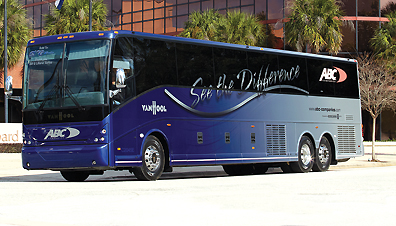
ABC Bus Companies and Van Hool thrive in partnership
By David Hubbard
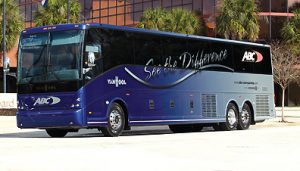
The day Clancy Cornell, a local businessman in Faribault, MN, went all in with his love for buses and purchased the Faribault Bus Company in 1957 from his brother Eddie, he planted the seed for the family legacy that would grow into ABC Companies.
The Van Hool legacy dates back to the post-war Belgium, when the young entrepreneur Bernard Van Hool applied his keen business sense to what he saw as a growing need for public transportation. Having already launched Van Hool Transport in 1947, he set his sights on coach building and manufacturing. Partnering with his brother-in-law and engineer, Frans Van Bouwel, Bernard Van Hool started with building coach bodies and eventually complete vehicles. This family operation included significant roles for all eight of his sons.
Inevitability, more than fate brought these families and their respective businesses together in a partnership that melds the sales and marketing expertise of ABC Companies with the flexible manufacturing platform of Van Hool. Together, the two companies provide the North America bus and motorcoach industry as well as a host of public transit agencies a diverse range of vehicles and service offerings.
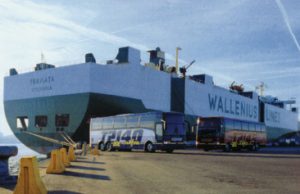
ABC Companies operates a comprehensive service network from seven locations throughout the U.S. and Canada to support Van Hool customers, providing extensive OEM service, repairs and parts for transit buses and motorcoaches. Additionally, ABC Companies offers private and municipal financing and leasing options through the company’s financial services group.
Van Hool is the largest independent bus and coach manufacturer in Europe, exporting over 80 percent of its production to over 80 countries.
Headquartered on 136 acres in Lier-Koningshooikt near Antwerpen, Belgium, Van Hool employs 4,000, as well as 200 at its plant in Bree.
Deeply entrenched in their respective businesses, sharing the same basic values as family members and entrepreneurs, the partnership ABC and Van Hool created in 1987 has become part of the industry fabric in North America, with the second and third generations now at the helm.
“Our mutual success stems from our common threads of being able to understand and see through the trials and tribulations inherent in a family-operated business,” says ABC Companies President and CEO Dane Cornell. “Additionally, both companies have been able to extend the core values to our non-family employees and build strong and lasting business relations.”
Paths merge toward partnership
Van Hool had been testing the bus and coach market in the U.S. starting in 1983, with sales executive Hugo De Roo, with the backing and active support of the Van Hool family leading the company effort in the United States.
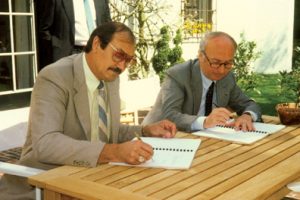
“We began with a 40-foot bus with two doors derived from our European range with components we thought were compatible with the American market,” De Roo says. “We were trying to sell direct and also working through separate regional dealerships throughout the country. But at the end of the day, we found something to be missing in these business arrangements.”
Based on its expertise manufacturing for markets worldwide, De Roo says Van Hool had no problem on its end delivering the product. The company prides itself in its flexibility and products tailor-made to accommodate a new niche in the market. But according to De Roo, Van Hool was less sure about their associates on the sales side.
As the mission of ABC Companies never included the manufacture of its own products, but rather to represent, sell and service motorcoaches, it was looking for a solid partnership with stalwart coachbuilder following its limited stint with Neoplan USA.
The families meet
The Cornell family met the Van Hools for the first time in January 1987 during what was then the United Bus Owners Association (UBOA) conference in Tampa, FL.
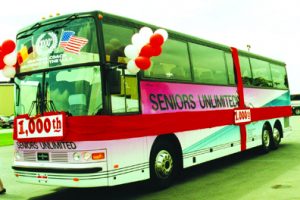
“Both parties were in sync the moment we introduced ourselves and began discussions,” says Filip Van Hool. “Our cultures may be a little different as we are from different parts of the world, but a partnership seemed so natural because of all we value in our families and our businesses, and our mutual interest in the same industry.”
De Roo says by mid April both companies had written and signed its first distributor agreement. Soon after, ABC accepted its first Van Hool T815 motorcoach.
“This took place before my time,” says Van Hool. “But it stills feels good.”
Cornell says from the moment the two organizations became business partners, it was no longer business as usual for either company.
“This unique combination of strengths is lethal,” he says. “We have enabled our companies to change on a dime, to be able to spot a new market and respond with the type of vehicle necessary to meet the need.”
For example, along with providing luxury coaches to independent charter operators, ABC Companies is refurbishing buses for Greyhound in Napannee, IN, selling highly-customized coaches to Google for employee shuttles, and double decks to Megabus.com.
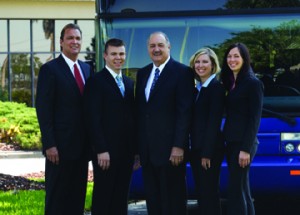
“We always felt sales and distribution were our strong suits,” says Cornell. “We built our team around them.”
Van Hool says its strength lies in the flexibility of its vertical integrated production system.
“We can build what we need to when we need to build it,” says Van Hool. “We do not limit ourselves to particular makes and models. We have the capability to develop and manufacture vehicles to accommodate any market worldwide according the requirements and preferences of the customer.”
De Roo says the partnership with ABC resolved the challenges in Americanizing its European two-door coach range.
“We thought we had a good fit,” he says. “We quickly learned what we needed to do to a larger extent, from reworking everything from the outside dimensions to the internal mechanics, as well as getting a better grasp on U.S. legislation, regulations and standards.”
On the good advice from its new partner, Van Hool went to work stretching the existing platform to 45 feet, a length not permitted in Europe at the time. In 1996 the companies unveiled the Van Hool T2140 and T2145 at Disneyworld, the U.S. version of the European T9 Acron. It marked the start of a distinct American product range, which was further extended in 2000 with the introduction of the C2045, a charter /commuter coach.
Van Hool and ABC Bus further formalized the partnership in 1998 with Van Hool’s acquisition of an ownership share in ABC Bus, committing financially to the combined strengths of customer service and proven European technology.
“Now, after nearly 25 years with ABC Companies, we are very happy to call the American market our second home,” says Van Hool. “Certainly, more so now than when we first arrived in the 1980s.”
Van Hool says the American market yields approximately 30 percent turnover in total product sales.
“Our broadened scope allows us to provide products and service to many different industry segments,” says Cornell. “We understand these diverse operations and specific vehicle needs. Neither company is afraid to delve into uncharted territory and try to come up with untried solutions, which spurs us to grow and thrive.”
ABC takes giant steps
Between 1975 and 1999 ABC added four additional facilities in California, New Jersey, Texas and Florida. In 2001, the company consolidated all of its operating subsidiaries re-branded ABC Companies.
In May 2007, it opened its 30,000 square-foot parts warehouse in Garden Grove, CA, which has since relocated to the newer service center in nearby Costa Mesa as the primary West Coast parts facility.
By that summer ABC Companies had announced its acquisition of Muncie Transit Supply including its Ontario, Canada, subsidiary, Baker Transit Parts. Muncie is the largest independent supplier of replacement parts to the transit bus industry in North America. The sole focus is full-service aftermarket parts distribution for the transit and coach industries. ABC Companies now stands as one of the largest part suppliers to the transit and coach market.
Megabus.com and the TD925
The TD925 Double Deck coach Van Hool developed for the Stagecoach Group is indicative of the Van Hool philosophy of flexible production and strong industry partnerships.
Stagecoach President Brian Souter came to Van Hool five years ago with an idea he had for new regional bus service in North America.
“I met Brian Souter for the first time a few days before Christmas in a hotel at an airport near Brussels,” says Filip Van Hool. “He asked me rather informally if we could build such a double-deck coach suitable for the North American markets and I told him it was possible.”
Van Hool says he made good on his promise within six months and delivered the first unit within 10 months.
“We developed and fine tuned his concept together,” says Van Hool. “Before, it was not so popular in the U.S. to travel by bus, but with the introduction of the Megabus concept and the TD925, the perception seems to be changing. Modern coaches have certainly caught the attention of young people, 20 to 30 year olds, and especially traveling college students.”
Cornell concurs that Megabus.com has been very successful in getting people out of their cars and into public coach transport.
“This venture and this vehicle has had a way of uniting all the stakeholders and creating new excitement for this market,” he says. “The modern high-tech amenities and luxury seating in the TD925 has attracted a new clientele in the U.S.”
The partnership serves public transit
In terms of the history of ABC Companies and its past focus, public transit is a relatively new arena. The companies unveiled the first Van Hool low-floor buses for public transport in the U.S. — the 40-foot A330 and 60-foot articulated AG300 — at the 2002 APTA Expo in Las Vegas, NV.
Three years later, APTA Expo 2005, Dallas, TX, marked the launch of the 40-foot Van Hool A330 Fuel Cell as the result of a partnership between AC Transit, Van Hool, ABC Companies and other American companies and public agencies. After an initial order for three A330 Fuel Cell buses, AC Transit, Oakland, CA, stepped up later with an additional order for eight A300L Fuel Cell buses, the largest ever U.S. order for hydrogen fuel cell buses, and followed with an additional order for four more A300L hydrogen fuel cell buses.
APTA 2005 also saw the introduction of the 30-foot A300K transit bus, which is now in service with AC Transit, Oakland, CA, as well as the Circulator for WMATA, Washington, D.C.
Over time, Canadian transit systems, STRSM, Montreal, QB, and York Rapid Transit, York ON, acquired AG300 60-foot articulated low-floor transit buses. In addition York Rapid Transit also bought A330 40-foot low-floor transit buses.
“We have been able to serve vehicle procurements from agencies purchasing outside the Buy America provisions using independent non-federal funding,” says Cornell. “AC Transit, Salt Lake City MAX, the Washington D.C. Circulator and the University of Minnesota have enjoyed success with the A300L 40-foot low-floor transit bus. We are getting more inquiries from agencies that do not require or do not choose to go through the Buy America requisites.”
What is next?
Noting that the American coach market has declined over the last 10 years, Van Hool believes as operators in every segment look for ways to gain an edge, to customize for specific needs and recognition, myriad opportunities exist for its tailor-made products.
An example might be something along the line of the Van Hool Altano, the expanded high deck tour coach the company introduced in Europe several years ago that features a larger baggage area, more passenger space with a separate driver compartment below the cabin.
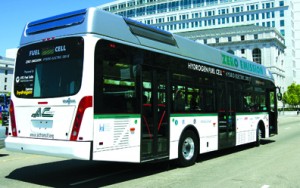
“ABC Companies recently tested the Altano in the U.S.,” says Van Hool. “It drew enough interest for us to consider it sometime in the future. It would not be difficult for us to develop a vehicle of this type for North America.”
Cornell says his company and Van Hool will stay in the transit market with the A300L to keep the Van Hool in name out in front of the transit industry.
“I still have dreams of Van Hool one day becoming a fixture in the U.S. bus and coach industry,” says Cornell. “My hope is for either a final assembly facility, or better yet, an All-American Van Hool product that satisfies Buy America requirements.”
With the third generations of Cornells and Van Hools forecasting new paradigms and technologies for conducting business, company leaders from both companies feel assured the partnership is financially healthy with sights set on the future.
“Our strengths lie in our long and diverse track record, and Van Hool’s tremendous range of vehicles and flexibility,” says Cornell. “Our hope is for us to always be able to positively influence the growth of the industry and growth of coach travel.” BR
